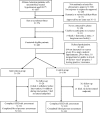A randomized trial of peer coach and office staff support to reduce coronary heart disease risk in African-Americans with uncontrolled hypertension
- PMID: 22570108
- PMCID: PMC3445668
- DOI: 10.1007/s11606-012-2095-4
A randomized trial of peer coach and office staff support to reduce coronary heart disease risk in African-Americans with uncontrolled hypertension
Abstract
Objective: Adopting features of the Chronic Care Model may reduce coronary heart disease risk and blood pressure in vulnerable populations. We evaluated a peer and practice team intervention on reduction in 4-year coronary heart disease risk and systolic blood pressure.
Design and subjects: A single blind, randomized, controlled trial in two adjacent urban university-affiliated primary care practices. Two hundred eighty African-American subjects aged 40 to 75 with uncontrolled hypertension.
Intervention: Three monthly calls from trained peer patients with well-controlled hypertension and, on alternate months, two practice staff visits to review a personalized 4-year heart disease risk calculator and slide shows about heart disease risks. All subjects received usual physician care and brochures about healthy cooking and heart disease.
Main measures: Change in 4-year coronary heart disease risk (primary) and change in systolic blood pressure, both assessed at 6 months.
Key results: At baseline, the 136 intervention and 144 control subjects' mean 4-year coronary heart disease risk did not differ (intervention=5.8 % and control=6.4 %, P=0.39), and their mean systolic blood pressure was the same (140.5 mmHg, p=0.83). Endpoint data for coronary heart disease were obtained for 69 % of intervention and 82 % of control subjects. After multiple imputation for missing endpoint data, the reduction in risk among all 280 subjects favored the intervention, but was not statistically significant (difference -0.73 %, 95 % confidence interval: -1.54 % to 0.09 %, p=0.08). Among the 247 subjects with a systolic blood pressure endpoint (85 % of intervention and 91 % of control subjects), more intervention than control subjects achieved a >5 mmHg reduction (61 % versus 45 %, respectively, p=0.01). After multiple imputation, the absolute reduction in systolic blood pressure was also greater for the intervention group (difference -6.47 mmHg, 95 % confidence interval: -10.69 to -2.25, P=0.003). One patient died in each study arm.
Conclusions: Peer patient and office-based behavioral support for African-American patients with uncontrolled hypertension did not result in a significantly greater reduction in coronary heart disease risk but did significantly reduce systolic blood pressure.
Trial registration: ClinicalTrials.gov NCT00948714.
References
-
- Centers for Disease Control and Prevention. National Vital Statistic Report. Vol. 57, Num 14 Table B. http://www.cdc.gov/nchs/data/nvsr/nvsr58/nvsr58_19.pdf, accessed Jan 5, 2012.
-
- Centers for Disease Control and Prevention. Health United States, 2008. Table 71. http://www.cdc.gov/nchs/data/hus/hus08.pdf, accessed Jan 5, 2012.
Publication types
MeSH terms
Associated data
LinkOut - more resources
Full Text Sources
Medical


